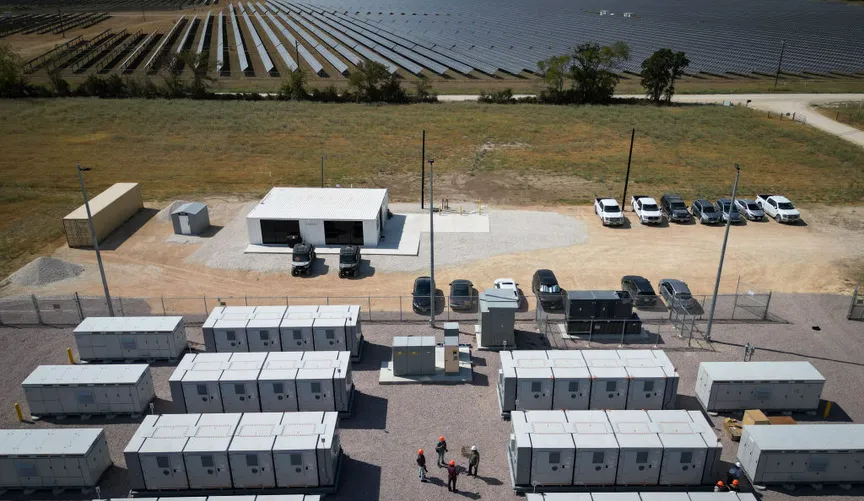
A simple principle has shaped Texas’ electricity system for the last two decades: Developers should build the types of power plants they think will compete best on the state’s open market.
As the cost of solar, wind, and grid batteries has plummeted in recent years, developers in the Lone Star State have increasingly opted to build clean energy projects — a whole lot of them. The state generated the most clean power in the nation last year, and solar and storage dominate new power capacity forecast to come online in 2025.
That principle — and Texas’ rapidly expanding clean energy industry — could be thrown out the window if a bill that recently passed the state Senate becomes law, Julian Spector reports for Canary Media. The legislation would require 50% of new power plant capacity in the state to be“sourced from dispatchable generation other than battery energy storage,” penalizing solar and wind power, which pair best with batteries.
An earlier iteration of SB 388 explicitly called for half of new power plants to “use natural gas,” and though the bill text no longer says that, the outcome would be the same: Gas would be the key beneficiary.
But developers aren’t exactly lining up to build gas plants. It can take years to source the specialized parts needed to get gas power plants built and running, while solar panels and batteries are mass-produced and can be installed far more quickly and cheaply. In fact, back in 2023 Texas created a $5 billion fund to issue low-interest loans to companies building gas power plants — but last month a developer that had applied for loans for two such projects withdrew them due to “equipment procurement constraints.”
An SB 388–driven slowdown of renewable deployment would meanwhile pose reliability challenges for the state, which famously suffered major blackouts in 2021 in large part because of challenges in the gas system. Since then, solar and batteries have repeatedly helped the state avoid weather-related outages. And with data centers, cryptocurrency mining operations, and new manufacturing all slated to boost Texas’ energy demand, the state is going to need more cheap, fast, clean power — not less.
Put reliability over politics, power grid leaders say
Leaders of the country’s seven power operating systems told Congress on Tuesday that it should prioritize reliability over politics as it considers the future of the U.S. energy system. Electricity demand is set to rise dramatically as more data centers and other power-hungry facilities come online and people adopt EVs and electric appliances. Pitting clean energy against fossil fuels will only lead to power shortages and higher prices, the executives said.
New England in particular faces a “serious challenge” if political battles over clean energy continue, the head of its grid operator said. The region is counting on offshore wind to meet growing demand, but President Donald Trump’s attacks on the industry throw that future into uncertainty.
Hyundai brings ‘low-carbon’ steel, EV manufacturing to the U.S.
Hyundai Motor Group announced a $21 billion investment on Monday that will amp up its U.S. manufacturing presence. Nearly $6 billion will go toward a “low-carbon” steel plant in Louisiana that will supply the company’s Alabama and Georgia auto factories, Alexander C. Kaufman reports for Canary Media. The low-carbon claim comes from Hyundai’s plans to use an electric arc furnace. But it’s only a small step toward greener steel, one environmental advocate told Canary, since Hyundai will likely still use fossil gas in its process.
Also this week, Hyundai opened a giant plant outside of Savannah, Georgia, where it’ll manufacture its increasingly popular Ioniq EVs.
Renewables on the rise: Wind, solar, and other renewables were installed at an astonishing pace last year — but energy emissions still increased as demand for electricity soared. (Canary Media)
Tesla’s global challenges: Tesla faces more setbacks as Chinese EV firm BYD reports 2024 revenue that exceeds the U.S. company’s, and as its market share continues to fall in Europe. (CNN, Reuters)
Energy dominance?: Energy executives express deep concerns about the oil and gas sector’s outlook in a new Dallas Fed survey, pointing to President Trump’s trade and tariff policies as headwinds that will drive up drilling costs. (Reuters)
Building to decarbonization: A new report details the many ways buildings must decarbonize — from the materials they’re built with to how they’re powered and heated — and the massive amount of coordination it’ll take to make that happen. (Canary Media)
Recycling revolution: The need for metals and minerals for the clean energy transition poses a huge environmental toll, but the U.S. can combat that by accelerating recycling, which has stalled in comparison to some other countries. (Grist)
Coal’s comeback: The Trump administration rolls back coal plant regulations as utilities move to extend the life of facilities to meet an anticipated spike in power demand from tech companies, though critics warn hopes of a coal comeback are “wishful thinking.” (Washington Post)
Get-out-of-pollution-free card: The U.S. Environmental Protection Agency says it will no longer “shut down any stage of energy production” that doesn’t pose an imminent health threat, a move a former Biden EPA official says amounts to the agency telling companies, especially those selling fossil fuels, that it will let them break the law. (New York Times)
Fossil-fueled feedback loop: Hotter weather is driving increased fossil-fuel use as it spurs people to run air conditioners more often, creating a vicious cycle of climate change, the International Energy Agency finds. (New York Times)

Two opposing forces are tugging at the global energy transition: the inexorable rise of clean energy and the insatiable demand for electricity.
Last year, over 700 gigawatts of clean energy capacity were installed worldwide, per a March International Energy Agency report. That’s more than double the amount built in 2022.
Despite the blistering growth of carbon-free power, global emissions from the power sector rose by 1.7%.

Renewable resources produced 32% of the world’s electricity last year. That’s just shy of coal’s share of 35%. Taken together with nuclear power, carbon-free sources met over 40% of global electricity demand in 2024 — a record high.
The reason clean energy is producing more power than ever is simple: The world is building staggering amounts of new clean capacity. Most of this is happening in China, and the vast majority of what’s being built is solar power. In 2024 alone, 553 GW of solar panels were installed worldwide; the sun-powered resource is growing so fast that it keeps forcing industry analysts to revise their forecasts upward.
So, why aren’t power-sector emissions falling? Because global electricity use is surging.
Power demand rose by 4.3% last year, per the IEA, nearly double the average annual growth rate over the past decade. And while clean energy’s slice of the electricity production pie is bigger than ever, the overall pie itself is growing. The net effect: Power plants ultimately burned through 1% more coal, gas, and oil last year than they did in 2023, even though the global share of electricity produced by fossil fuels actually declined.
Air conditioning was a key driver of this uptick in demand, thanks to a devastating feedback loop: As emissions from burning fossil fuels push global temperatures to record heights, people use more AC — in turn creating more demand for electricity that is still produced using mostly fossil fuels. Data centers and other industrial customers are also boosting demand.
The only way to meet the urgent need for more power and bring down emissions at the same time is to build clean energy — solar, wind, batteries, or hydropower and nuclear — faster than even last year’s record-setting pace.
This story was updated on March 28 with details about global power sector emissions in 2024.
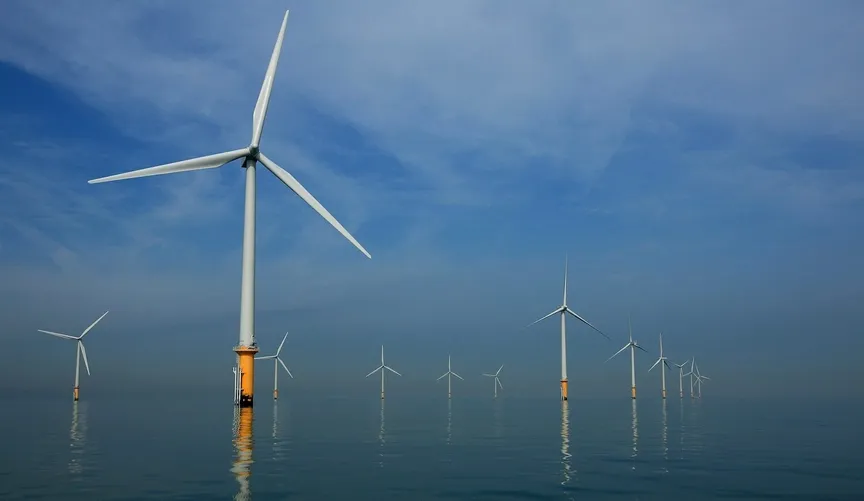
When ecologist Anthony Bicknell went looking for fish around the foundations of wind turbines a dozen or so miles off the coast of Scotland in the North Sea, he wasn’t sure what he’d find.
But he was ready for something surprising. Around that time, some European lobsters were catching researchers off guard by taking up residence in wind turbine foundations in the waters off of the British Isles. Sure enough, Bicknell and his team counted two more sea creatures that scientists had never documented congregating around wind turbines: a flatfish known as a dab and, most strikingly, haddock.
Haddock is one of Scotland’s highest-value commercial fish, ranking above cod and just below herring in total number of fish caught annually. Unlike cod, haddock don’t usually hang out around shipwrecks and other human-made structures on the seafloor.
The discovery that these sleek silvery fish are utilizing wind foundations, described in a study published earlier this year, demonstrates how much researchers are still learning about the potential benefits of installing wind structures in the ocean floor.
Offshore wind is growing rapidly in some parts of the world, particularly in northern Europe and China, as nations look to complement other carbon-free resources like solar.
In the U.S., the industry has faced opposition from the fishing industry, environmentalists, and other anti-wind groups who have raised concerns about how turbines will affect marine life. False claims about offshore wind’s impact on ocean animals — especially whales — have been spread by opponents including President Donald Trump, who issued an executive order on his first day in office that has slowed the industry to a crawl.
The new study from Bicknell, a senior research fellow at the University of Exeter, is the latest in a growing body of research that suggests offshore wind turbines, like other hard structures introduced to the seabed, can not only coexist with marine life but potentially benefit certain species.
Scientists have repeatedly found, for example, that an oil rig or oil platform can become an oasis of hard structure in ocean expanses devoid of much else but sand. They attract barnacles, shellfish, invertebrates, and, eventually, the fish that like to eat those creatures. An entire food web can grow.
Studies like Bicknell’s find the same phenomenon is playing out around some wind turbines installed on the seafloor of the North Sea. Except, unlike oil rigs, these massive pieces of infrastructure are helping to reduce the carbon emissions caused by burning fossil fuels, which is rapidly warming the ocean and devastating marine life worldwide.
Bicknell and his coauthors discovered that the older the wind foundation, the more fish — and sometimes bigger fish — like to call it home. This is true, they found, for many demersal fish like flatfish, haddock, and cod, which sit lower on the food chain. His team focused on the U.K. offshore wind farms known as Beatrice and Moray East; some of the studied turbines were built in 2017, while others went in around 2020.
These studies also underscore that offshore wind farms are clearly changing the ocean. Scientists are still debating which species are most feeling the change.
“Are they good or bad for fish? The caveat is, well, what fish?” said Bicknell.
Take the case of the European lobsters that like to turn wind foundations into homes. In 2021, researchers tagging lobsters around turbines installed off the coast of North Wales found that almost half of tagged animals hung out around a turbine’s base to find food or hide from predators. The doughnut of rocks and boulders deposited around a turbine’s base may also protect the lobsters. At least one tagged lobster ended up in a local fisherman’s trap, providing the first anecdotal evidence that turbines can support lobsters that also feed people.
For haddock, the turbines are more like a buffet. Bicknell described the fish as enjoying what he and other scientists call “indirect benefits.” Because haddock don’t usually hang around hard structures, preferring instead the sandy sea bottom, the groups that showed up on the researchers’ underwater cameras likely come there to feed and then leave. His study provides more evidence that wind foundations may increase the availability of food for many fish.
Some of these discoveries are helping researchers in the U.S., where offshore wind has been slow to catch on. Five projects are actively under construction in the country, but only one commercial-scale offshore wind project, South Fork Wind, is in operation today. Meanwhile, the U.K. has over 40 offshore wind installations with a total capacity of 15 GW plugged into its grid.
“I think when it comes to surveying offshore wind infrastructure for fish, yes, we are a little bit behind,” said Brendan Runde, a marine ecologist with The Nature Conservancy who is based in Virginia.
Runde is part of an ongoing research project to understand how fish use two wind turbines installed off the coast of Virginia as part of a 2020 pilot by Dominion Energy. This installation — and the fish that use it — serve as a glimpse of what’s to come in the region’s waters. Less than a mile away, the state’s first commercial-scale project is under construction and, according to its developer Dominion, on track to be completed in 2026.

During construction, wind farms could have negative effects on fish, said Runde.
Artificial noise, changes to seafloor sediment, and newly laid cables that emit electromagnetic fields can all impact fish in the short-term. However, his team’s research has found that the Atlantic sturgeon, an endangered species, and a variety of sharks are not avoiding the area even during ongoing construction.
At least 78 wind foundations have already been installed off the coast of Virginia, according to Dominion, while new ones continue to be built in spite of federal headwinds from Trump. In Virginia, offshore wind has a history of bipartisan support, and Gov. Glenn Youngkin, a Republican, is a vocal supporter of Dominion’s 2.6-gigawatt, 176-turbine project.
Runde’s research is ongoing and must now endure a challenging political moment for the offshore wind sector. In addition to calling wind farms “garbage” and vowing to halt the construction of new turbines, President Trump has gutted the National Oceanic and Atmospheric Administration of staff and resources in recent months. Runde actively collaborates with NOAA scientists on this research, and his project itself is funded by the NOAA Northeast Fisheries Science Center.
When it comes to measuring the long-term benefits of these structures, Runde and his team use some of the same methods as their British counterparts: baited remote underwater video, which measures fish abundance, size, and diversity at the pilot turbines. The foundations they explore can reach depths of 120 feet below the water’s surface.
Black sea bass are already making homes out of these foundations. Runde said that one fish that was tagged at a Virginia wind foundation in February 2024 was still there seven months later when he returned.
“We know that, for many species of fish, this wind foundation is a really big deal,” said Runde.

It’s become the animating question in the U.S. electricity industry: How can power-hungry data centers get the energy they need?
The obvious answers have proven insufficient. Solar and wind power projects face yearslong wait times to interconnect to constrained grids. Moves to siphon off existing nuclear power to avoid these grid bottlenecks have proven controversial. And building new fossil gas–fired power plants will not only worsen climate change but may simply be impossible on the timeline that data centers require given current gas turbine backlogs.
But there may be faster and cheaper ways to bring lots of clean energy online to match new data center demand — it just requires some creative thinking.
One idea is to couple new clean power with some of the dirtier, if only rarely used, fossil-fuel power plants already connected to the grid — an approach that, counterintuitively enough, could end up not just faster but cleaner than alternatives.
That’s the proposition think tank RMI lays out in a recent paper describing the potential for so-called “power couples,” which the authors define as lots of new solar, wind, and batteries connected to existing fossil gas–fired “peaker” plants, which basically act as emergency generators for the grid at large, all in service of a data center or other facility that uses large amounts of power.
The biggest data centers now being planned across the country by tech giants like Amazon, Google, Meta, and Microsoft can use hundreds of megawatts to gigawatts of electricity. In some of the country’s biggest data center hot spots, there simply isn’t enough capacity left to connect that much new load right now.
But in the “power couple” structure, those data centers wouldn’t even draw from the grid, explained Uday Varadarajan, a senior principal at RMI’s carbon-free electricity program and co-author of the report. Instead, they’d be connected to clean power behind the “point of interconnection” between peaker plants and the grid at large.
That could also allow new large-scale clean power projects to connect directly to the data center. Some of those solar, wind, and battery developments are already permitted and awaiting grid interconnection — and all of them can be built much faster than new gas-fired power plants, according to industry experts. Allowing some of these projects to avoid the interconnection backlogs and grid upgrade costs would get clean power online much faster.
Of course, few if any data centers can rely solely on the sun and wind to serve their round-the-clock power needs, even with batteries to store some of that power for when demand is highest. That’s where the peaker plant comes in, Varadarajan said.
Peaker plants can serve as a circuit breaker of sorts between the grid on one side and the new data center and all its clean power and batteries on the other side. When there’s not enough clean power for the data center, “we allow the new load to draw from the existing gas plant in a limited way,” he said. The key is making sure the data center doesn’t impinge on when the grid needs that peaking power.

In that sense, the peaker plants are more like gas-fired backups for a largely clean power mix. It’s a natural fit: Peaker plants are designed to fire up only when the grid really needs them, largely during summer heat waves or winter cold snaps when demand for electricity peaks (hence their name).
That leaves a lot of hours when those plants aren’t using their connections to the grid at large — which creates an opening for clean power to use them, Varadarajan said. Developers will probably want to “overbuild” the amount of dedicated solar, wind, and batteries supplying data centers, so they can rely on those resources during more hours of the year. That means the renewables will often generate more than the data center needs at a particular moment, but in the power couple arrangement that extra power wouldn’t go to waste — it’d flow to the grid using the peaker plant’s oft-idle grid connection.
Importantly, from the perspective of a utility or grid operator, this setup is potentially far less disruptive than adding a big new load or trying to interconnect a brand-new source of generation, Varadarajan said. Many U.S. grid operators already have rules to allow sites that have grid connections to add different types of generation capacity or to use a power plant’s existing capacity more frequently.
And because the data centers will have all the power they need behind the interconnection point, power couples won’t have to enter the complicated technical and regulatory realm of projects that both inject and draw power from the grid — a status that can be a significant hangup for battery and “hybrid” battery-solar or battery-wind projects in some regions.
RMI mapped the lower 48 states for suitable power-couple sites, looking for peaker plants with enough available land within a 10-kilometer radius to be able to build solar power that can cover at least 60% of an accompanying data center’s annual electricity needs. But the sites identified in its analysis could add significantly more clean power than that — about 88% of the modeled data centers’ annual power consumption on average.
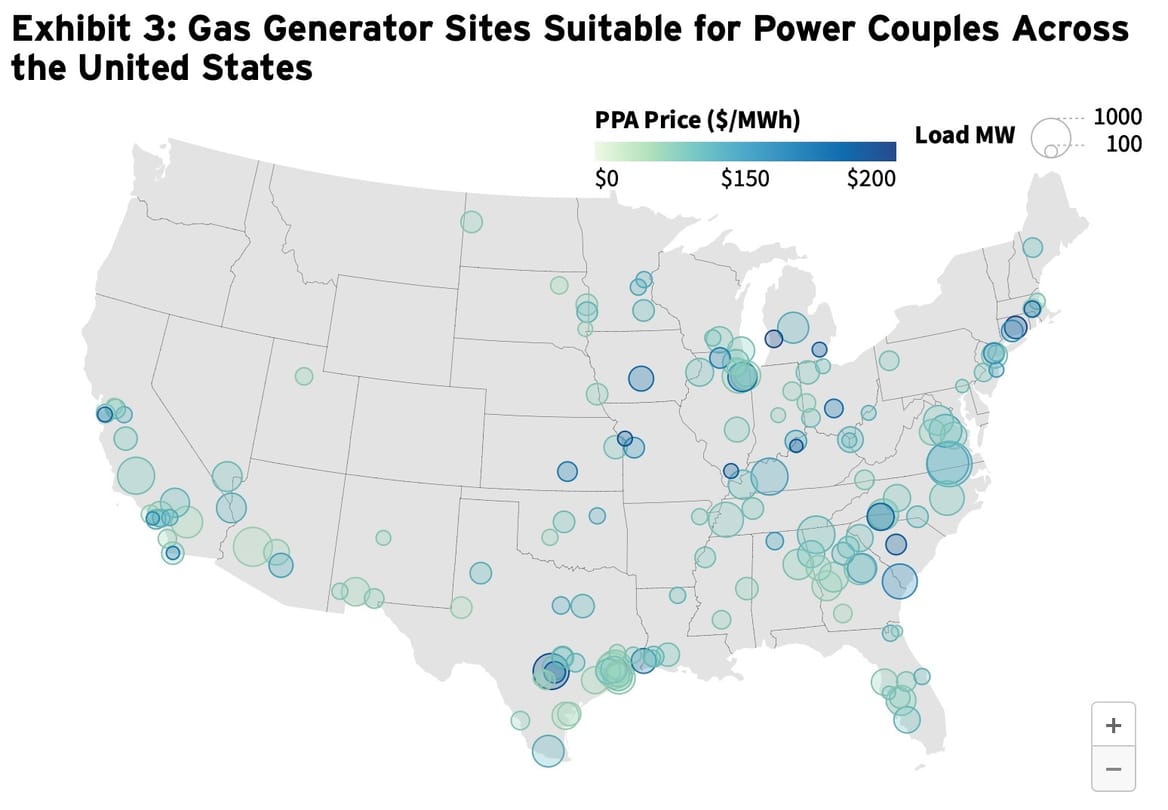
RMI’s analysis wasn’t limited solely to peaker plants. Of the roughly 160 power plants in its final report, just over 40 were combined cycle gas turbine (CCGT) power plants, a more efficient type of gas-fired power plant. Most CCGTs tend to operate regularly throughout the year to provide “baseload” grid power, but RMI looked at some “load-following” CCGTs, which ramp up and down as grid demand rises and falls, and are therefore idle often enough to supply a power couple’s data center needs.
As for cost, RMI’s analysis found that more than 50 gigawatts of new data center or “other concentrated loads” could be supported by power couple developments at an all-in price of no more than $200 per megawatt-hour. More than 30 gigawatts of that new construction could be powered at less than $100 per megawatt-hour.
Those prices are higher than what data center developers might expect to secure from utilities with low-cost power, ample grid capacity, and an eagerness for the economic development such customers could bring. They’re also higher than recent average prices for solar and wind power purchase agreements in the U.S.
But for the tech giants and data center developers competing for scarce space on crowded grids, price could no longer be as significant as being able to get power quickly. Industry analysts have calculated that Microsoft may be offering more than $100 per megawatt-hour for the power it will get from a deal with Constellation Energy to restart a nuclear reactor at the Three Mile Island site in Pennsylvania — and that’s for power that won’t be delivered until near the end of the decade at the earliest.
Faster routes to getting clean power online could be worth an even greater premium, Varadarajan said — and “a lot of the data centers aren’t particularly price-sensitive to begin with.” So the price ranges for the power couples RMI analyzed are “not completely crazy.”
The price points also vary widely across the sites that RMI modeled. In some cases, they can drop into the $60 per megawatt-hour range, well within striking distance of plain-vanilla power purchase agreements for clean energy — although those lower-cost options also tended to yield less annual clean energy supply.

Even at higher prices, solar and wind power that flows directly to data centers could be attractive for tech companies like Google and Microsoft that are striving to achieve 24/7 clean energy targets. “This is a product that’s giving you bundled capacity, energy, and clean power,” Varadarajan said.
In fact, the concept laid out in RMI’s report looks a bit like what Google and partners Intersect Power and TPG Rise Climate are undertaking in a plan to invest $20 billion through 2030 in newly built wind, solar, and batteries to mostly power new data centers.
Intersect Power CEO Sheldon Kimber has proposed that this is a better way to meet growing demand for industrial-scale electricity, rather than trying to negotiate the complex and sometimes contradictory regulatory and economic hurdles required to add generation and loads to utility grids.
Intersect Power has proposed building its own gas-fired generation instead of relying on existing peaker plants. Whatever the fossil-fuel backup source, Kimber told Canary Media that parts of the country with good solar and wind resources can probably power a big load like a data center with electricity that’s carbon-free about 80% or more of the year.
A power couple also looks something like the “energy parks” concept that think tank Energy Innovation put forth in a December report. Energy parks are combinations of large loads like data centers powered by new solar, wind, and batteries — and some fossil-fuel backup power — all connected to the grid at a single point.
For clean energy developers, the ability to secure a major customer and avoid grid interconnection wait times and grid upgrade cost uncertainties takes away a lot of risk, said Eric Gimon, Energy Innovation policy adviser and a co-author of the group’s recent report. “You still need permits — but you’re not waiting for years to learn if you can interconnect or not. And you’ve got a committed buyer” for the newly built power.
That’s not to say that current regulations make these kinds of projects easy. It’s probably simplest in Texas, where a deregulated energy regime has allowed clean energy and batteries to thrive. That’s where Google and Intersect Power are planning their first projects.
The situation is more mixed in other parts of the country, depending on the rules that apply. For example, RMI has tracked gigawatts of new generation added to existing power plants’ grid connections under so-called “surplus interconnection service” rules across the territories of the Midcontinent Independent System Operator and Southwest Power Pool, two entities that manage transmission grids and energy markets across a swath of Midwestern and Great Plains states.
But PJM Interconnection, which manages the transmission grid and energy markets providing power to about 65 million people from Washington, D.C., and 13 states from Virginia to Illinois, has only recently started amending its regulatory regimes to allow this surplus interconnection option in ways that energy developers say they can work with.
In many parts of the country where utilities retain monopolies over the right to build generation, operate power grids, and sell electricity to all customers in their service territories, pathways for other companies to build and own clean energy remain largely untested.
But those “vertically integrated” utility territories could also be a key venue for energy parks, according to Ari Peskoe, director of Harvard Law School’s Electricity Law Initiative.
Peskoe co-wrote a recent paper laying out the risk that utilities may build power plants and expand their grids to serve gigawatts of new data center demand and then pass on a disproportionate share of those costs to ratepayers.
Energy parks could help insulate everyday customers from these potential rate hikes, he wrote, since only the companies building the data center and the new generation would be responsible for the costs involved. But for that to happen, state lawmakers will have to make these arrangements legal.
Or utilities could build power couples themselves. RMI’s analysis finds that opportunities exist in the deregulated market of Texas and the backed-up grids managed by PJM but also across much of the Southeastern U.S. where utilities largely retain monopoly status over generation, grids, and retail customers. Those utilities face massive demand growth from prospective data centers — and pressure from tech companies to find cleaner options than gas-fired power plants.
The technical potential for using existing grid connections to boost clean power capacity is enormous. A report from think tank GridLab and the University of California, Berkeley found surplus interconnection sites across the country that could support nearly 700 gigawatts of new generation.
To be sure, that’s a theoretical maximum that’s almost certain to remain unrealized due to real-world constraints and basic energy economics. “But a screaming success would be that we could unlock 10% of that opportunity” over the next decade, said Ric O’Connell, GridLab’s founding executive director.
That won’t be simple to achieve. One early hurdle is setting up the contractual structures between existing power plant owners and the developers of data centers and clean energy, O’Connell said. Even when those are done, conflicts could arise between power-couple project partners and incumbent generators, transmission grid owners, and utilities.
“There’s a lot of regulatory risk behind this approach that I hope can be mitigated because the benefits are really strong,” he said.
Varadarajan agreed that power couples are “not an easy transaction to do. I’m not saying it won’t be complicated.” But as reports like those from RMI, GridLab, and Energy Innovation indicate, “this is a good opportunity for everyone to take a look at what they’ve got and use their interconnection rights to the greatest value.”
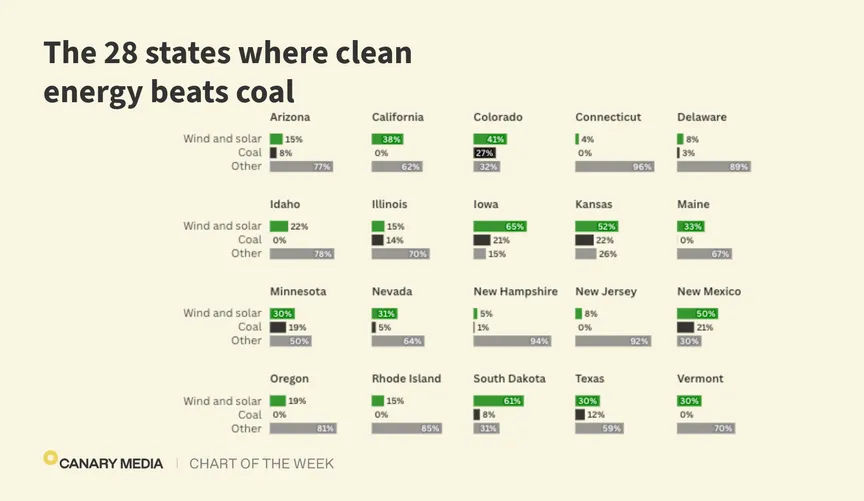
The U.S. hit a major energy-transition milestone last year: For the first time ever, it produced more electricity from wind and solar than from coal.
Over half of U.S. states now get more power from breeze-blown turbines and sun-soaked photovoltaic panels than they do from polluting, planet-warming coal, according to a new report from think tank Ember.
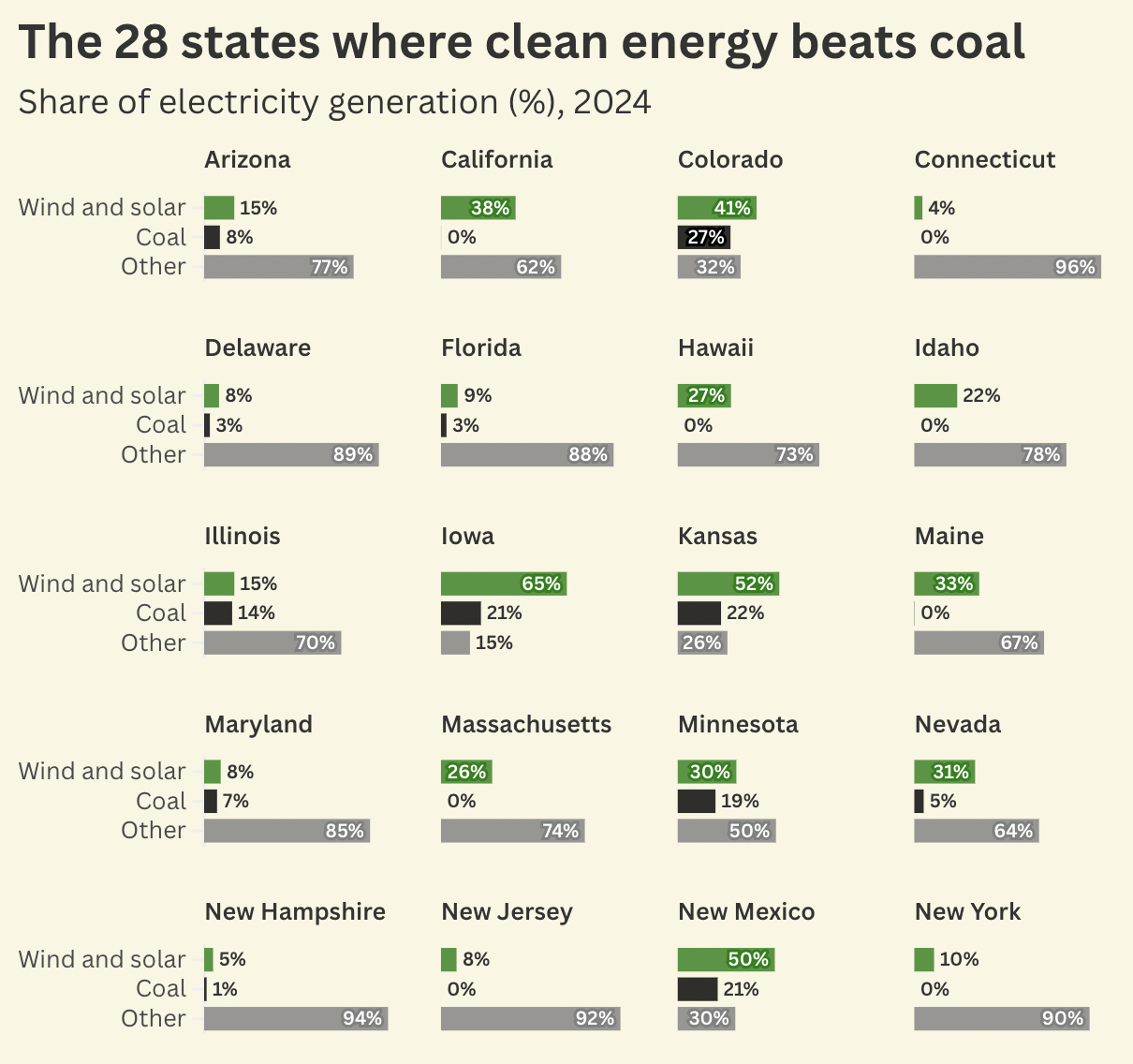

Coal is the most environmentally destructive source of electricity available. For a long time, it was the most widely used power resource in the U.S., too.
Two decades ago, the country got about half of its electricity from coal-fired power plants. Today that number is just 15%. Wind and solar have ascended over the same time period. Together they now produce 17% of U.S. electricity, and solar is set to lead power capacity additions again this year.
Beyond their climate benefits, renewables beat coal on economics. A 2023 report found that all but one U.S. coal plant could be cost-effectively replaced by a combination of solar, wind, and batteries, though that finding relied on Inflation Reduction Act tax credits that some Republican lawmakers want to repeal.
The rise of cheap fossil gas spurred by the fracking boom has also played a key role in phasing out coal. Gas use has soared in the decades that coal has declined; it alone produced nearly 43% of U.S. power last year.
In 2025 the U.S. Energy Information Administration expects that 8.1 gigawatts worth of coal will be retired from the grid — equal to nearly 5% of the nation’s operating coal fleet as of 2024. Over the next five years, 120 coal plants are slated to shutter, helping reduce the carbon intensity of electricity and air pollution for local communities.
In other words, the yearslong decline of coal is set to continue. Unless, that is, the Trump administration’s burgeoning effort to rescue the industry succeeds.
Energy Secretary Chris Wright and Interior Secretary Doug Burgum both said last week that the government is working to halt coal plant closures. And just this week, President Donald Trump wrote on Truth Social that he is authorizing his administration “to immediately begin producing energy with BEAUTIFUL, CLEAN COAL.”
No specific plans have yet been announced.

Speaking to fossil fuel executives and other energy leaders at the CERAWeek conference last week, U.S. Energy Secretary Chris Wright made a bold claim.
“Everywhere wind and solar penetration have increased significantly, prices on the grid went up and stability of the grid went down,” he said.
But that claim is“not borne out by the data at all,” Robbie Orvis, the senior director of modeling and analysis for nonpartisan think tank Energy Innovation, told Canary Media’s Jeff St. John. In fact, a report out Thursday from Orvis and his colleagues found that clean energy is key to keeping U.S. electric bills in check.
The analysis looks at what would happen if congressional Republicans succeed in repealing the Inflation Reduction Act tax credits that have helped supercharge clean energy adoption in the U.S. The result of such a repeal? Dirtier air, more carbon emissions — and higher power bills. The average household’s energy bills would rise $48 per year by 2030 and $68 by 2035. Three other recent studies echo Energy Innovation’s findings, including one released Thursday by Rhodium Group.
The reason bills would rise is straightforward: Cutting IRA incentives would discourage the construction of solar and wind, which have become the cheapest sources of new power generation over the past decade.
Aside from electricity cost, clean energy boasts several other economic advantages over fossil fuels. A 2023 Energy Innovation report found that 99% of the country’s coal plants could be cost-effectively replaced with wind, solar, and batteries. The industry is also a growing employer, with jobs in clean energy expanding at more than twice the rate of the country’s entire job market in 2023. And numerous studies show that curbing fossil fuel use drastically reduces particulate matter and other air pollutants, which in turn helps people avoid health care costs.
Those benefits — specifically lower energy costs and job creation — are why a group of Republican Congress members are pushing to keep IRA incentives in place. Some conservative advocates and business leaders are joining them and making a case that clean energy is the cheapest, quickest way to achieve the “energy dominance” President Donald Trump is looking for.
Two clean energy projects get Trump’s green light
The U.S. Energy Department on Monday sent a $56.8 million loan disbursement to Holtec’s Palisades nuclear plant in Michigan, which will help the company restart the shuttered facility. It’s just a tiny first slice of the up to $1.52 billion loan Holtec could receive, but it indicates the Trump administration supports the Biden-era project even as many others remain in question. The federal Bureau of Land Management also approved a transmission line that will serve a utility-scale solar project in southern California — and went so far as to say the project will support “American Energy Dominance.”
But don’t expect a clean-energy change of heart just yet. Federal funding uncertainty still has dozens of projects in the lurch, including a Louisiana community solar program and a plan to transform a New York City fossil-fuel power plant into a hub for wind, geothermal, and storage.
How the Russia-Ukraine war sped up Europe’s clean transition
It’s been three years since Russia invaded Ukraine and upended Europe’s energy system. In the wake of the invasion, the EU rapidly reduced its reliance on Russian fossil gas by building renewables, shifting to electric heat, and sourcing liquefied natural gas from the U.S., Canary Media’s Julian Spector reports. The continent’s overall gas use fell during that time, with mild winters and higher fuel prices playing a role as well. Analysts say it’s clear the war sped up the transition — and a lot of that gas demand won’t be coming back.
Bird’s-eye view: The Nature Conservancy, Planet, and Microsoft use satellite imagery to map large-scale solar and wind installations around the world. (New York Times, Global Renewables Watch)
Green bank update: A federal judge temporarily blocks the U.S. EPA from taking back $20 billion inBiden-era “green bank” funding this week, though nonprofits won’t yet be able to access that money. (Politico)
Heat-pump road map: California is the first in the nation to create a statewide heat-pump deployment plan, which will help it meet its goal of installing 6 million electric heat pumps by 2030. (Canary Media)
Where renewables beat coal: The U.S. got more of its electricity from wind and solar than from coal last year, with renewables beating out the fossil fuel in 28 states. (Canary Media)
Super Soakers to super batteries: An Alabama entrepreneur who developed the Super Soaker water gun is using proceeds from his inventions to develop a new battery he says doesn’t require the same cooling systems as lithium-ion batteries. (Forbes)
Supersonic charging: Chinese company BYD announces a charging technology it says could“fill up” an EV in just five minutes — a development that could reinvigorate U.S. charger investment. (Axios)
Vermont’s climate battle: Vermont has long built a reputation as a climate leader, but its Democratic lawmakers face an uphill battle to pass more clean energy measures this session as Republican Gov. Phil Scott attempts to roll back parts of the state’s landmark climate law. (Canary Media)
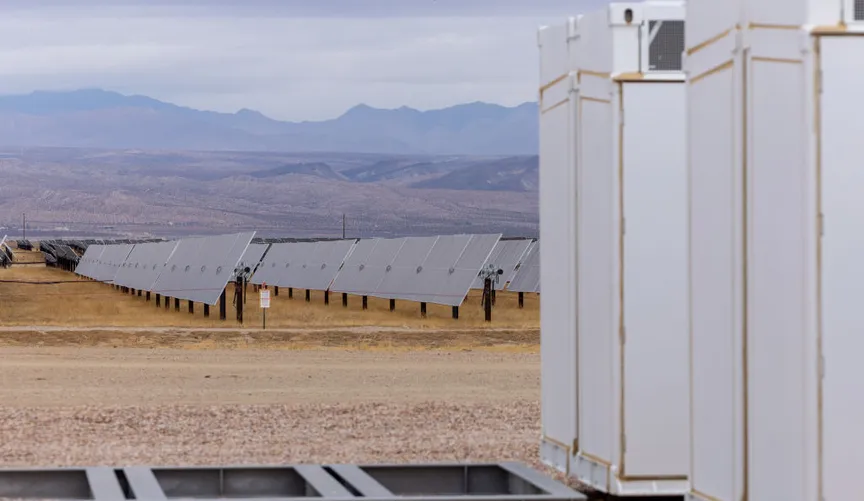
A wave of new reports and data out this week showed just how good of a year 2024 was for U.S. clean energy, especially solar and batteries. Here are a few highlights:
2025 could be another big year. The U.S. Energy Information Administration predicts solar will once again lead power plant construction and that energy storage deployment will shatter last year’s record.
But those predictions come with two major caveats: The White House and Congress.
The Trump administration has already taken direct aim at offshore wind construction and at loans that were set to support battery factories and other clean energy projects. Developers fear Congress will roll back Inflation Reduction Act investment and production tax credits, which are a major reason why clean energy deployment and manufacturing surged in the past year.
House Republicans’ budget talks haven’t yet targeted those particular incentives, and 21 GOP Congress members this week called for preserving them. Still, the IRA’s precarious position is making it hard for clean energy developers to plan ahead. As Morningstar analyst Brett Castelli put it to Heatmap, “all businesses like certainty” — and Congress and the Trump administration aren’t providing much of that these days.
Here are two more big stories from this week:
A lot is going on at the U.S. Environmental Protection Agency this week. For starters, EPA Administrator Lee Zeldin said he terminated $20 billion in federal “green bank” funds for climate nonprofits, Canary Media’s Jeff St. John reports. A judge seemed skeptical of Zeldin’s allegations of “misconduct, conflicts of interest, and potential fraud” in a Wednesday hearing.
Zeldin also announced Wednesday that he’s targeting dozens of climate and environmental regulations for rollback. Power plant and tailpipe emissions rules are among those on the chopping block, though experts say it could take years — and willing courts — for Zeldin to achieve his deregulatory dreams.
The EPA has also canceled more than 400 grants across “unnecessary programs,” Zeldin said, though he wouldn’t specify further. It all comes on top of plans to shutter the EPA’s environmental justice offices, just days after Zeldin recalled workers in those offices from administrative leave.
Energy industry leaders met this week in Houston for the annual CERAWeek conference, which turned into a celebration of all things fossil fuels. U.S. Energy Secretary Chris Wright kicked things off with a promise that the Trump administration will “end the Biden administration’s irrational, quasi-religious” climate policies, while fossil fuel executives praised President Donald Trump’s deregulatory push and announced they are stepping back from clean energy promises.
But it wasn’t all love for Trump policies. Some fossil fuel leaders quietly aired their grievances with the president’s trade fights, saying they’re driving up costs even as he tries to boost the industry.
The latest on tariffs: Ontario’s premier lifts a 25% surcharge on Canadian power exported to Michigan, Minnesota, and New York, but President Trump’s tariffs on steel and aluminum imports from the country and beyond still went into effect Wednesday. (CNN)
Climate suits safe for now: The U.S. Supreme Court declines to hear an argument by 19 Republican attorneys general seeking to limit states’ abilities to sue fossil fuel companies for climate damages. (New York Times)
It’s all about timing: Time-of-use electricity rates, which charge customers more during times of high power demand and less when it’s low, could make heat pumps more financially worthwhile in areas where fossil gas is cheaper than electricity. (Canary Media)
Dive deeper: A time-of-use rate pilot program helped Chicago-area utility customers save money, and it will soon let more residents opt in. (Canary Media)
Power plant preparations: Several states are devising tax incentives and loosening regulations to encourage power plant construction and prepare for rising electricity demand stemming from data center expansions. (Associated Press)
Sunshine State: Florida built 3 GW of utility-scale solar last year, second only to Texas, even as the state’s Republican leadership continued to fight climate action. (Canary Media)
Reliving EV history: A Chicago-area environmental justice community is reigniting its 100-year history as an electric vehicle hub by building a charging network it hopes can get more Black and Brown drivers into EVs. (Canary Media)
Smells like clean energy: A startup is adapting fusion technology to blast through rock that would destroy conventional drill bits, letting it get deeper into the Earth to unlock hotter geothermal power — and the result smells like toasted marshmallows. (Canary Media)
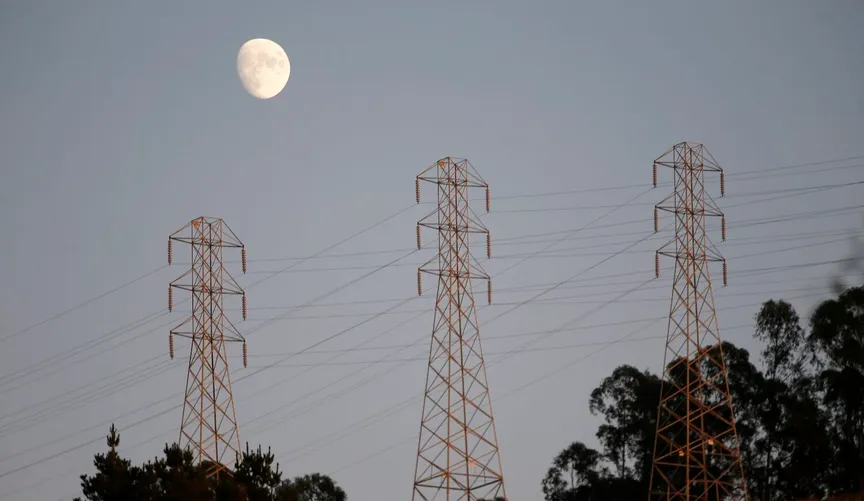
Everyone agrees that California’s major utilities are charging too much for electricity. But as in previous years, state lawmakers, regulators, and consumer advocates are at odds over what to do about it.
With the state’s three biggest utilities reporting record profits even as customers’ rates have skyrocketed, critics say the time is right to pass laws that will force regulators to more tightly control key utility costs — or even outright curb utility spending and profits.
Customers of Pacific Gas & Electric, Southern California Edison, and San Diego Gas & Electric now pay roughly twice the national average for their power, with average residential rates rising 47% from 2019 to 2023, according to a January report from the state Legislative Analyst’s Office.
Rates are set to climb even further in the coming years as utilities look to expand their power grids to meet growing demand from data centers, electric vehicle charging depots, and millions of households buying EVs and heat pumps. Utilities also need to build high-voltage transmission lines to connect far-off clean energy resources to population centers. And they need to harden and protect thousands of miles of low-voltage power lines to prevent deadly wildfires in a landscape that’s growing more susceptible to conflagration because of climate change.
Utilities are allowed to earn a profit on these infrastructure investments and to pass the costs onto customers — but only within reason. It’s the job of regulators to ensure that profits aren’t disproportionate to what utilities charge ratepayers.
Consumer advocates are now demanding that the California Public Utilities Commission be more aggressive in challenging PG&E, SCE, and SDG&E’s spending plans, which have allowed them to earn more profits than ever over the past year. In October, Gov. Gavin Newsom (D) ordered the CPUC to issue a report on how to curb rate increases.
“There’s agreement that record-breaking shareholder earnings make no sense along with skyrocketing costs,” said Mark Toney, executive director of The Utility Reform Network (TURN), a ratepayer advocacy group, and that “utilities need to be held more accountable for their spending.”
TURN is supporting a list of bills being introduced in this year’s legislative session that take aim at utility costs. Some would increase state regulator oversight on utility grid spending. Others seek to forbid utilities from spending ratepayer funds on lobbying and advertising and strengthen CPUC oversight of potential “double recovery,” or utilities collecting funds for projects already financed via other means.
Beyond TURN’s list of favored bills, there are more aggressive legislative proposals that would limit utility rate increases to no higher than the general rate of inflation and force utility shareholders to pay more into a state fund created to shelter utilities from bankruptcy as a result of having to pay for catastrophic wildfires caused by their equipment. PG&E was forced into bankruptcy in 2019 under these conditions after a failure of one of its power lines sparked the state’s deadliest-ever wildfire in 2018.
Legislation that would order the CPUC to increase oversight of utility spending or limit the costs utilities can pass on to customers faces an uphill battle. Last year, a number of reform proposals faltered in the face of heavy lobbying from utility workers unions and pushback from utilities, which spend generously on state political campaigns.
But with customers of California’s three big utilities now paying the highest rates in the nation outside Hawaii and one in five California households struggling to pay their monthly bills, the public pressure to do something may outweigh utility lobbying muscle, advocates say.
Last month, the California state Senate Energy, Utilities and Communications Committee held a legislative hearing where the CPUC briefed lawmakers on its new report on how to contain rate increases.
That report shied away from suggesting major clawbacks in utility spending or limiting profits. Instead, it focused on shifting some costs now passed through to ratepayers — including payments to customers who have rooftop solar, wildfire mitigation and recovery investments, and programs that boost energy efficiency and help low-income customers pay their bills — to “other sources of funding.” That could include state taxpayers, California’s cap-and-trade program, or customers of publicly owned utilities.
All of these proposals would require legislative action, and some lawmakers pushed back on the idea that utilities should be able to shift costs that are their responsibility under law. But CPUC President Alice Reynolds said the alternative — forcing utility shareholders rather than ratepayers to bear more costs — could violate legal precedents that allow utilities a “reasonable rate of return to attract investment in the system,” as she put it.
State Sen. Josh Becker (D), chair of the committee, said during the hearing that legislative leaders and Gov. Newsom’s office plan to put together a bill focused on energy affordability in the coming months.
Toney said he’s hopeful this affordability package “has some of the proposals that went down at the last minute last year, and that there’s going to be a lot more support for them” this year. But he was also critical of the CPUC’s report. “I’ll tell you what was missing” from it, he said — “any conversations about utility profits.”
PG&E, the state’s biggest utility, has reported record-breaking profits over the past two years. The average customer bill increased more than 35% between 2021 and 2023, and CPUC approved six PG&E rate hikes in 2024. The utility’s rates will increase again this year to cover the cost of keeping the Diablo Canyon nuclear power plant open.
SCE, the state’s largest electric-only utility, reported record-setting profits in 2024, after winning CPUC approval for rate hikes last year. Another rate hike was approved in January.
SDG&E reported profits near its all-time high last year after record-high profits in 2023 and 2022. The utility’s rates have increased to become among the highest in the nation, as shown in this chart from the state Legislative Analyst’s Office.
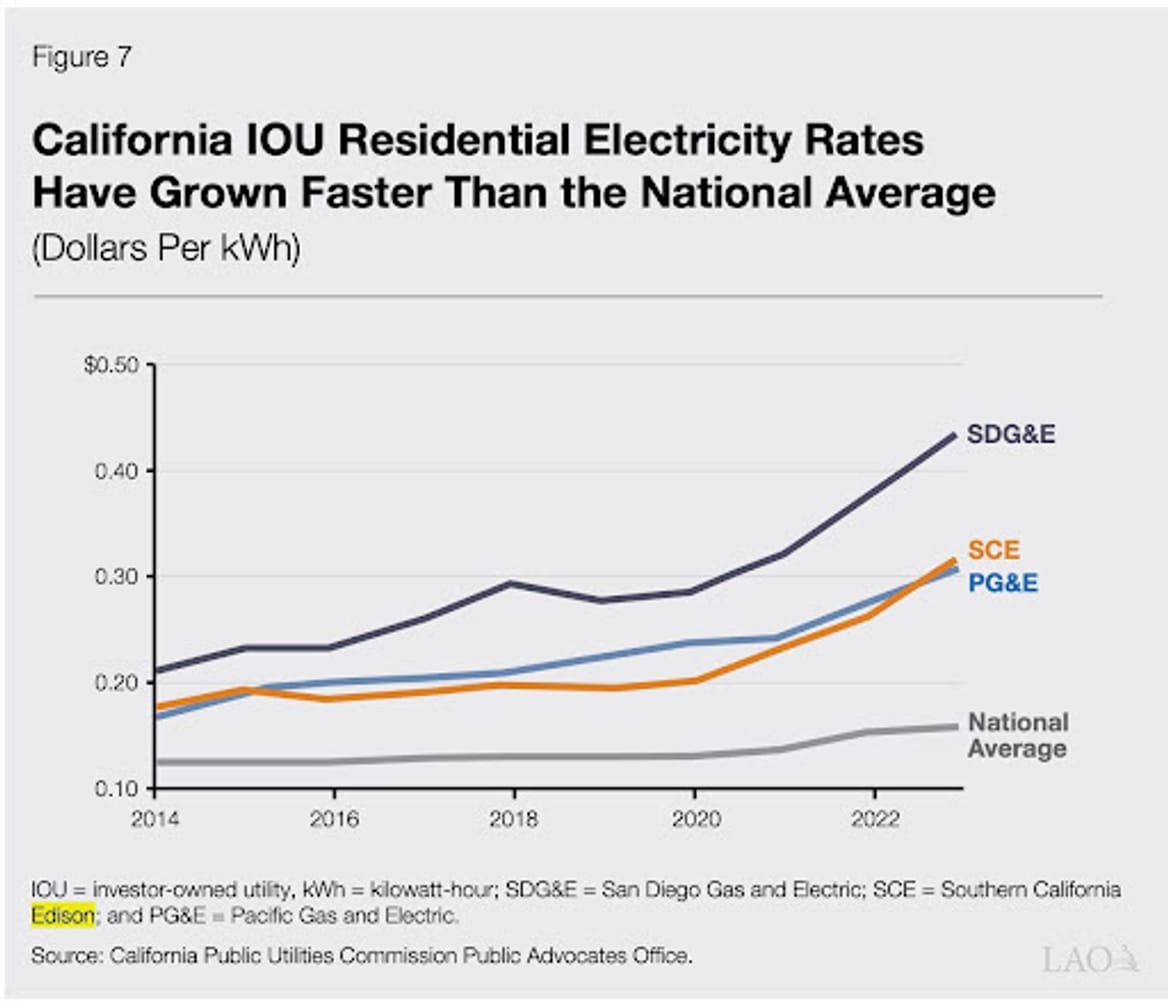
The CPUC’s report stated that “the biggest drivers of rate increases” are “the growth in spending to address wildfire mitigation” as well as “the cost shift that results from legacy Net Energy Metering programs,” which compensate customers with rooftop solar systems for electricity they send back to the grid. The CPUC delegated to secondary status the costs of “energy transition related investments in transmission and distribution infrastructure.”
But rooftop solar incentives don’t deserve most of the blame for rising rates, said Loretta Lynch, an attorney and energy policy expert who served as CPUC president from 2000 to 2002. She is also a longtime critic of the current CPUC commissioners appointed by Gov. Newsom.
Instead, she said during a February webinar presenting new data on the connection between utility spending and rising rates, “the primary drivers of a vast majority of the costs over the last five to 10 years have been extraordinary procurement” of clean energy at the early stages of the state’s energy transition, when solar power was far more expensive than today, and, more notably, “the tripling of the costs of transmission and distribution” grid investments over the past decade.
Other energy analysts, including some who strongly disagree with Lynch’s views on rooftop solar, share this perspective on the grid’s role in driving up utility costs.
Severin Borenstein, head of the Energy Institute at the University of California, Berkeley’s Haas School of Business, is a major backer of the proposition that rooftop solar is causing bills to rise for other customers. He reiterated that position in a February presentation to the Little Hoover Commission, an independent state oversight agency, noting the significant costs of “public purpose programs,” such as the billions of dollars that utility customers at large pay to support rooftop solar incentives and low-income ratepayer assistance.
But Borenstein also said a majority of the rising utility costs over the past decade are tied to investments in low-voltage distribution grids and wildfire hardening and prevention.
“Those last two sort of meld together because we’re spending a whole lot of money on upgrading our distribution network, reinforcing our distribution network, in some cases, under-grounding it, in order to reduce wildfires,” he said.
The below chart from the CPUC’s February report highlights the majority of costs that come from paying for electricity generation and maintaining the utilities’ sprawling low-voltage distribution grids.
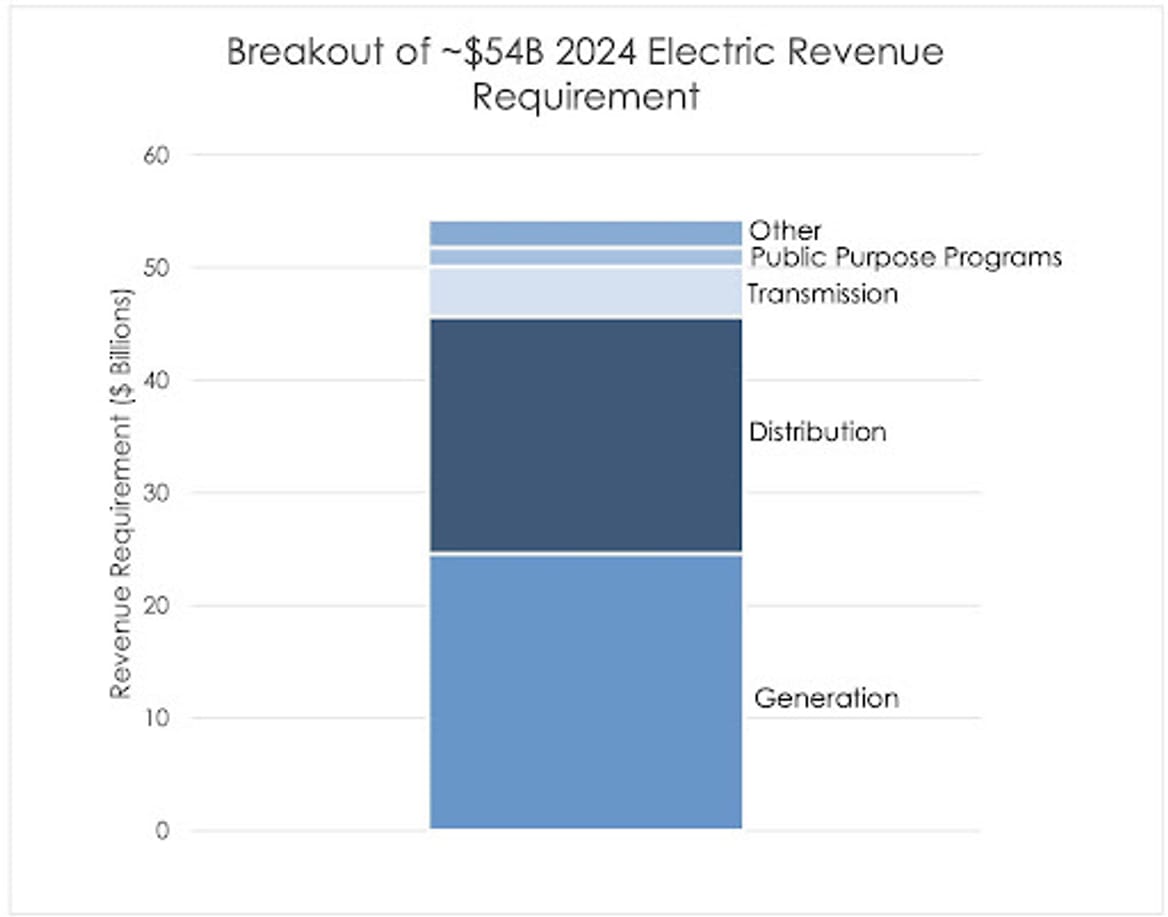
Borenstein agrees with the CPUC that rooftop solar incentives make up a significant portion of rising utility rates — a view that’s disputed by solar and environmental advocates. But even when the costs of net metering are calculated in the way that the CPUC proposes, they still make up a relatively small portion of typical residential utility customer bills compared to the “other” category that includes generation and grid costs, as the below chart from the Legislative Analyst’s Office report shows.

The Natural Resources Defense Council, one of the few environmental organizations that strongly favors reducing rooftop solar compensation, issued a report this week proposing a host of ways to reduce PG&E’s rates, including shifting those costs away from ratepayers. But NRDC also found that the “largest contributor to PG&E’s skyrocketing rates is the cost of vegetation management and hardening the grid to prevent wildfires,” making up more than half of the utility’s rate increases above the rate of inflation since 2018.
Going after those costs is tricky, however. When it comes to generation, utilities can’t back out of contracts for expensive power, even if they were signed more than a decade ago. Nor can they avoid buying power on the state’s energy markets during times when those prices spike.
Tackling grid costs puts regulators and lawmakers in a bind as well. Nobody wants utilities to skimp on critical investments like replacing aging equipment or protecting power lines from being knocked down by trees or high winds. Efforts to police utility grid investments risk forcing regulators and utilities to spend lots of time and effort delving into the minutiae of those plans without any clear promise of savings to show at the end of it.
Even so, Toney highlighted several bills being proposed this year, and others he hopes will be revived from last year’s session, that could drive down some of these costs.
On wildfire-related expenditures, he’d like to see a new bill that revives the policies proposed by SB 1003, a bill that failed to pass last year. The bill would have instructed the CPUC to limit utility wildfire spending outside of closely examined plans and put utility wildfire planning more squarely under the commission’s control.
Another option to address utility spending is AB 745, a bill that would increase state oversight of utility transmission grid upgrades. Energy analysts argue that a regulatory gap between federal and state authority over certain types of smaller grid projects has led to utility overspending on those projects. AB 745 cites a CPUC report that found $4.4 billion in transmission investments by California’s big utilities between 2020 and 2022, or nearly two-thirds of total grid spending, fell into this category.
California could also find other ways to pay for grid investments, Toney said. Those options can include securitization — having a utility issue bonds backed by the steady stream of payments its customers make on their bills — or the state issuing bonds to pay for certain utility costs. Both replace a portion of costs that are passed on to ratepayers, which “saves money because there’s no shareholder profit to be made,” he said.
SB 330, a bill proposed by state Sen. Steve Padilla (D), would authorize the state to “pilot projects to develop, finance, and operate electrical transmission infrastructure” via “low-cost public debt and alternative institutional models.” California will need to spend an estimated $45.8 billion to $63.2 billion on transmission by 2045, and an October report from the nonprofit Clean Air Task Force found that such public financing options could annually shave billions of dollars from rate increases in future years.
Some consumer advocates say lawmakers and regulators need to go after rising rates directly by limiting the return on investment that utilities are permitted to pass on to customers. Utility critics say that’s the most direct way to halt rate increases.
It’s also the most likely to trigger major pushback from utilities.
“We need to reduce the utilities’ profits to the national average or perhaps tie those profits to increases in safety,” Lynch proposed during February’s webinar. “As long as our policymakers focus on the wrong problem, we won’t find the right solution to reducing customers’ punishing and unwarranted bills.”
These efforts are hampered by the complexity and volume of data that goes into calculating such returns on investment as well as the fact that utilities control all the data. Indeed, utility critics have noted that recent rate-increase requests from PG&E have been approved by the CPUC in a perfunctory manner, with little to no attempt to order the utility to prove its cost increases were warranted.
Lynch blamed CPUC commissioners. ”It’s a fundamental failure of regulation, but it’s also a fundamental failure of political will to require the regulators to do their job as written in the law,” she said.
Utility finance expert Mark Ellis agreed that the CPUC needs to cut utilities’ profits. As an independent consultant and senior fellow at the American Economic Liberties Project, Ellis published a January paper accusing utilities of using financial legerdemain to justify excessive returns on their investments — and regulators of violating their duty to hold utilities to account.
The regulatory compact between states and investor-owned utilities boils down to this, he told Canary Media: “We’re going to give you a monopoly, but we won’t let you charge monopoly rents. Anything above your cost of capital is a monopoly rent.”
In an opinion piece in the San Francisco Chronicle, Ellis argued that California’s investor-owned utilities have been earning far above the cost of capital for decades — an assertion he backs up from experience working as former chief of corporate strategy and chief economist at Sempra, the holding company of Southern California Gas Co. and SDG&E.
The Energy Institute’s Borenstein agreed during his February presentation that utilities have “some important perverse incentives for capital investment” and that “cost of equity is the big point of contention because it’s hard to know what you need to pay stock shareholders to get them to invest.”
At the same time, “I don’t blame the CPUC for this,” he said. “I think the CPUC is massively understaffed and undercompensated, and they are just overwhelmed with the many things that they are required to do with limited staff. And when they get into these rate-of-return hearings, the utilities are able to bring world experts in finance.”
Ultimately, he said, “the CPUC is really outgunned and outmanned.”
Some lawmakers are going after utility profits more directly. SB 332, a bill sponsored by state Sen. Aisha Wahab (D), would cap investor-owned utility rate increases for residential customers to no more than the Consumer Price Index, a federal measure of cost-of-living inflation. It would also make shareholders rather than ratepayers provide more of the funding for the state’s utility wildfire fund — a sensitive issue amid rising investor uncertainty regarding SCE’s potential liability for January’s devastating Eaton Fire. SB 332 would also tie utility executive compensation to safety metrics.
“This bill flips the script and puts utility profits on the table,” said Roger Lin, a senior attorney at the nonprofit Center for Biological Diversity, which supports the legislation. While he conceded the proposal will face serious pushback from utilities, “we have to start looking at the systemic causes of the affordability crisis we have today in California.”

Last May, Florida enacted a law deleting any reference to climate change from most of its state policies, a move Republican Gov. Ron DeSantis described as “restoring sanity in our approach to energy and rejecting the agenda of the radical green zealots.”
That hasn’t stopped the Sunshine State from becoming a national leader in solar power.
In a first, Florida vaulted past California last year in terms of new utility-scale solar capacity plugged into its grid. It built 3 gigawatts of large-scale solar in 2024, making it second only to Texas. And in the residential solar sector, Florida continued its longtime leadership streak. The state has ranked No. 2 behind California for the most rooftop panels installed each year from 2019 through 2024, according to data the energy consultancy Wood Mackenzie shared with Canary Media.
“We do expect Florida to continue as No. 2 in 2025,” said Zoë Gaston, Wood Mackenzie’s principal U.S. distributed solar analyst.
Florida is expected to again be neck and neck with California for this year’s second-place spot in utility-scale solar installations, said Sylvia Leyva Martinez, Wood Mackenzie’s principal utility-scale solar analyst for North America.
Overall, the state receives about 8% of its electricity from solar, according to Solar Energy Industries Association data. The vast majority of its power comes from fossil gas.
The state’s solar surge is the result of weather — both good and bad — and policies at the state and federal level that have made panels cheaper and easier to build, advocates say.
“Obviously in Florida, sunshine is extremely abundant,” said Zachary Colletti, the executive director of the Florida chapter of Conservatives for Clean Energy. “We’ve got plenty of it.”
The state is also facing a growing number of extreme storms. Of the 94 billion-dollar weather disasters that federal data show unfolded in Florida since 1980, 34 occurred in the last five years.
“Floridians have long understood that not only is solar good for your pocket, it’s also good for your home resilience,” said Yoca Arditi-Rocha, the executive director of The CLEO Institute, a Miami-based nonprofit that advocates for climate action. “In the face of increasing extreme weather events, having access to reliable energy is a big motivator.”
The tax credits available under former President Joe Biden’s Inflation Reduction Act have also made buying panels cheaper than ever before, she said.
“A lot of people took advantage of that. I’m one of them,” Arditi-Rocha said. “As soon as I saw that the federal government was going to give me 30% back on my taxes, I decided to make the investment and got myself a solar system that I could pay back in seven years. It was a win-win proposition.”
But solar started growing in Florida long before Democrats passed the IRA in 2022, and that’s thanks to favorable state policies.
Municipalities and counties have little say over power plants, giving the Florida Public Service Commission ultimate control over siting and permitting. Plus, solar plants with a capacity under 75 megawatts are exempt from review and permitting altogether under the Florida Power Plant Siting Act.
The latter policy in particular has made building solar farms easy and inexpensive for the state’s major utilities, said Leyva Martinez. Companies such as NextEra Energy–owned Florida Power & Light, the state’s largest electrical utility, have for years patched together gigawatts of solar with small farms.
“We’re seeing this wave of project installations at gigawatt scales, but if you look at what’s actually being built, it’s a small 74-megawatt [project] here or 74.9-megawatt project there,” she said. “It’s just easier to permit in the state, and developers have realized that they can keep installations at this range and they don’t need to go through the longer process.”
The solar buildout has prompted some backlash in rural parts of the state. A bill Republican state Sen. Keith Truenow filed last month proposes granting some additional local control over siting and permitting solar farms on agricultural land.
“You’re starting to see a lot more complaining about the abundance of solar installations in more rural areas,” Colletti said. The legislation, he said, “would add some hurdles and ultimately add costs” but “wouldn’t necessarily reverse the state’s preemption” of local permitting authorities.
NextEra and Florida Power & Light did not respond to an email requesting comment. Nor did Truenow return a call.
While the bill is currently making its way through the Legislature, DeSantis previously vetoed legislation that threatened Florida’s solar buildout.
In 2022, the governor blocked a utility-backed bill to end the state’s net metering program, which pays homeowners with rooftop solar for sending extra electricity back to the grid during the day.
“The governor did the right thing by vetoing that bill that would have strangled net metering and a lot of the rooftop solar industry in Florida,” Colletti said. “I know Floridians are much better off for it because we are able to offset our costs very well and take more control and ownership over our households.”
A telephone survey conducted by the pollster Mason-Dixon in February 2022 found that among 625 registered Florida voters, 84% supported net metering, including 76% of self-identified Republicans.
“It’s not about left or right,” Arditi-Rocha said. “It’s about making sure we live up to our state’s name. In the Sunshine State, the future can be really sunny and bright if we continue to harness the power of the sun.”

As winter turns to spring, Texas is setting new records with its nation-leading clean energy fleet.
In just the first week of March, the ERCOT power grid that supplies nearly all of Texas set records for most wind production (28,470 megawatts), most solar production (24,818 megawatts), and greatest battery discharge (4,833 megawatts). Only two years ago, the most that batteries had ever injected into the ERCOT grid at once was 766 megawatts. Now the battery fleet is providing nearly as much instantaneous power as Texas nuclear power plants, which contribute around 5,000 megawatts.
“These records, along with the generator interconnection queue, point towards a cleaner and more dynamic future for ERCOT,” said Joshua Rhodes, a research scientist studying the energy system at The University of Texas at Austin.
The famously developer-friendly Lone Star State has struggled to add new gas power plants lately, even after offering up billions of taxpayer dollars for a dedicated loan program to private gas developers. Solar and battery additions since last March average about 1 gigawatt per month, based on ERCOT’s figures, Texas energy analyst Doug Lewin said. In 2024, Texas produced almost twice as much wind and solar electricity as California.
When weather conditions align, the state’s abundant clean-energy resources come alive — and those conditions aligned last week amid sunny, windy, warm weather. On March 2 at 2:40 p.m. CST, renewables collectively met a record 76% of ERCOT demand.
Then, on Wednesday evening, solar production started to dip with the setting sun. More than 23,000 megawatts of thermal power plants were missing in action. Most of those were offline for scheduled repairs, but ERCOT data show that nearly half of all recent outages have been “forced,” meaning unscheduled.
At 6:15 p.m. CST, batteries jumped in and delivered more than 10% of ERCOT’s electricity demand — the first time they’ve ever crossed that threshold in the state.
“Batteries just don’t need the kind of maintenance windows that thermal plants do,” said Lewin, who authors the Texas Energy and Power newsletter. “The fleet of thermal plants is pretty rickety and old at this point, so having the batteries on there, it’s not just a summertime thing or winter morning peak, they can bail us out in the spring, too.”
At some level, the March records show clean energy excelling in the conditions that are most favorable to it. Bright sun and strong winds boosted renewable generation, while temperate weather kept demand lower than it would be on a hot summer or a cold winter day. But those seemingly balmy circumstances could belie a deeper threat to the Texas energy system.
“One thing that I don’t think is talked about nearly enough is the potential for problems in shoulder season,” said Lewin.
If unusually hot weather struck during a spring day with lots of gas and coal power plants offline, ERCOT could struggle to meet demand, even if it was much lower than the blistering summer peaks. In fact, this happened in April 2006, when a surprise heat wave forced rolling outages, Lewin noted. Texas officials don’t talk much about climate change, but that kind of hot weather in the springtime is becoming more common.
Last summer produced ample data on how the surge in solar and battery capacity reduced the threat to the grid from heat waves and lowered energy prices for customers. This spring, batteries and renewables are showing they can also fill in the gaps when traditional plants step back.